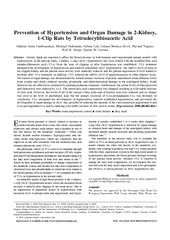Prevention of Hypertension and Organ Damage in 2-Kidney, 1-Clip Rats by Tetradecylthioacetic Acid
Gudbrandsen, Oddrun Anita; Hultström, Michael; Leh, Sabine Maria; Bivol, Liliana Monica; Vågnes, Øyvind; Berge, Rolf Kristian; Iversen, Bjarne M.
Peer reviewed, Journal article
Published version
Permanent lenke
https://hdl.handle.net/1956/5960Utgivelsesdato
2006-07-17Metadata
Vis full innførselSamlinger
Sammendrag
Dietary lipids are reported to affect the blood pressure in both humans and experimental animal models with hypertension. In the present study, 2-kidney, 1-clip (2K1C) hypertensive rats were treated with the modified fatty acid tetradecylthioacetic acid (TTA) from the time of clipping or after hypertension was established. TTA treatment attenuated the development of hypertension and reduced established 2K1C hypertension. The mRNA level of renin in the clipped kidney and the plasma renin activity were markedly reduced, and the plasma angiotensin II level tended to decrease after TTA treatment. In addition, TTA reduced the mRNA level of angiotensinogen in white adipose tissue. Prevention of organ damage was demonstrated by normal urinary excretion of protein, maintained serum albumin, lower heart weight, and clearly reduced vascular, glomerular, and tubulointerstitial damage in the nonclipped kidney. Renal function was not affected as estimated by unchanged plasma creatinine. Furthermore, the serum levels of triacylglycerol and cholesterol were reduced by TTA. The serum fatty acid composition was changed, resulting in a favorable increase of oleic acid. However, the levels of all of the omega-3 fatty acids and of linoleic acid were reduced, and no change was seen in the level of arachidonic acid, but the urinary excretion of 8-iso-prostaglandin F2 was declined. In conclusion, TTA attenuated the development of hypertension, reduced established hypertension, and prevented the development of organ damage in 2K1C rats, possibly by reducing the amounts of the vasoconstrictors angiotensin II and 8-iso-prostaglandin F2 and by inducing a favorable increase of oleic acid in serum.
